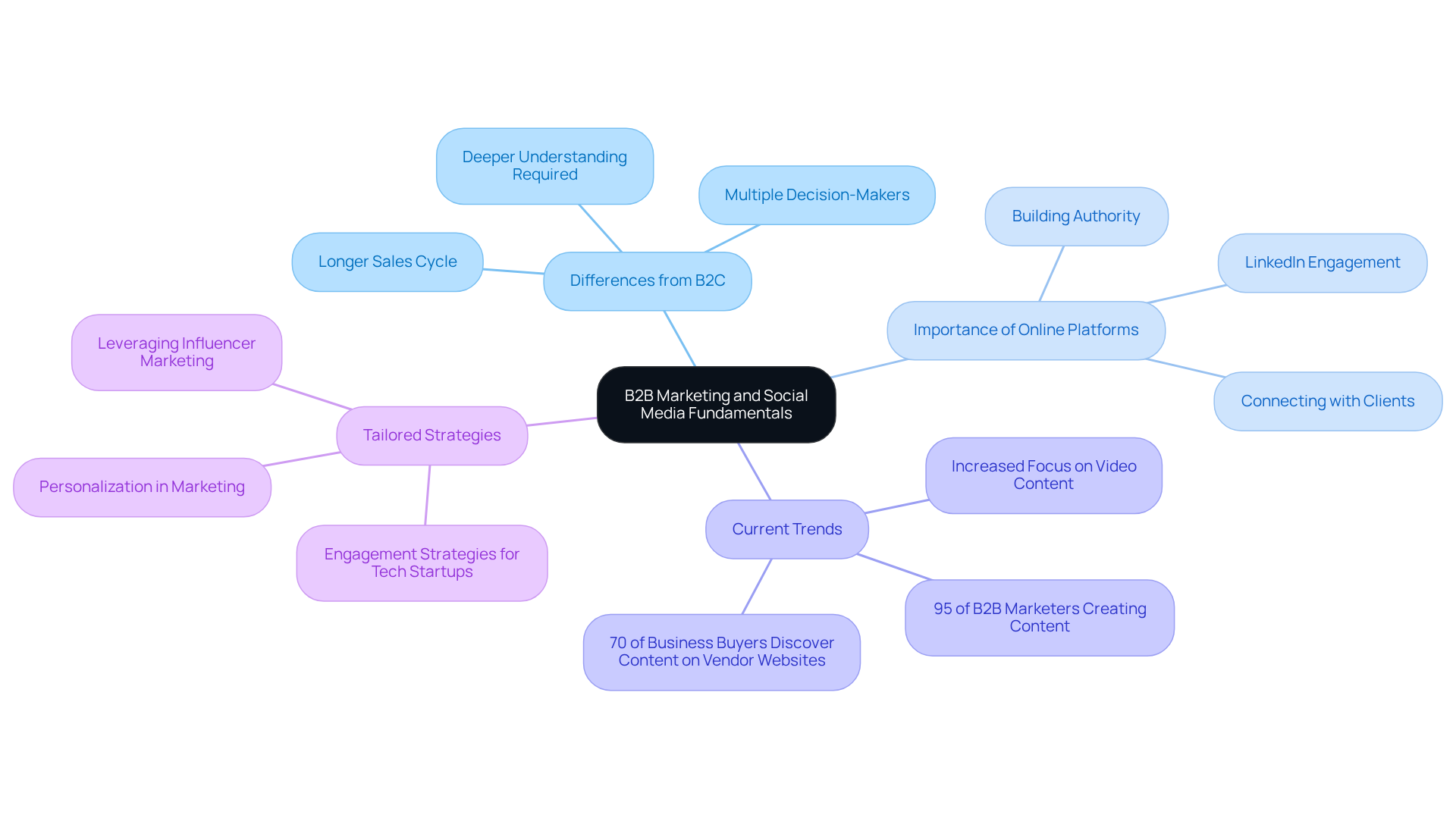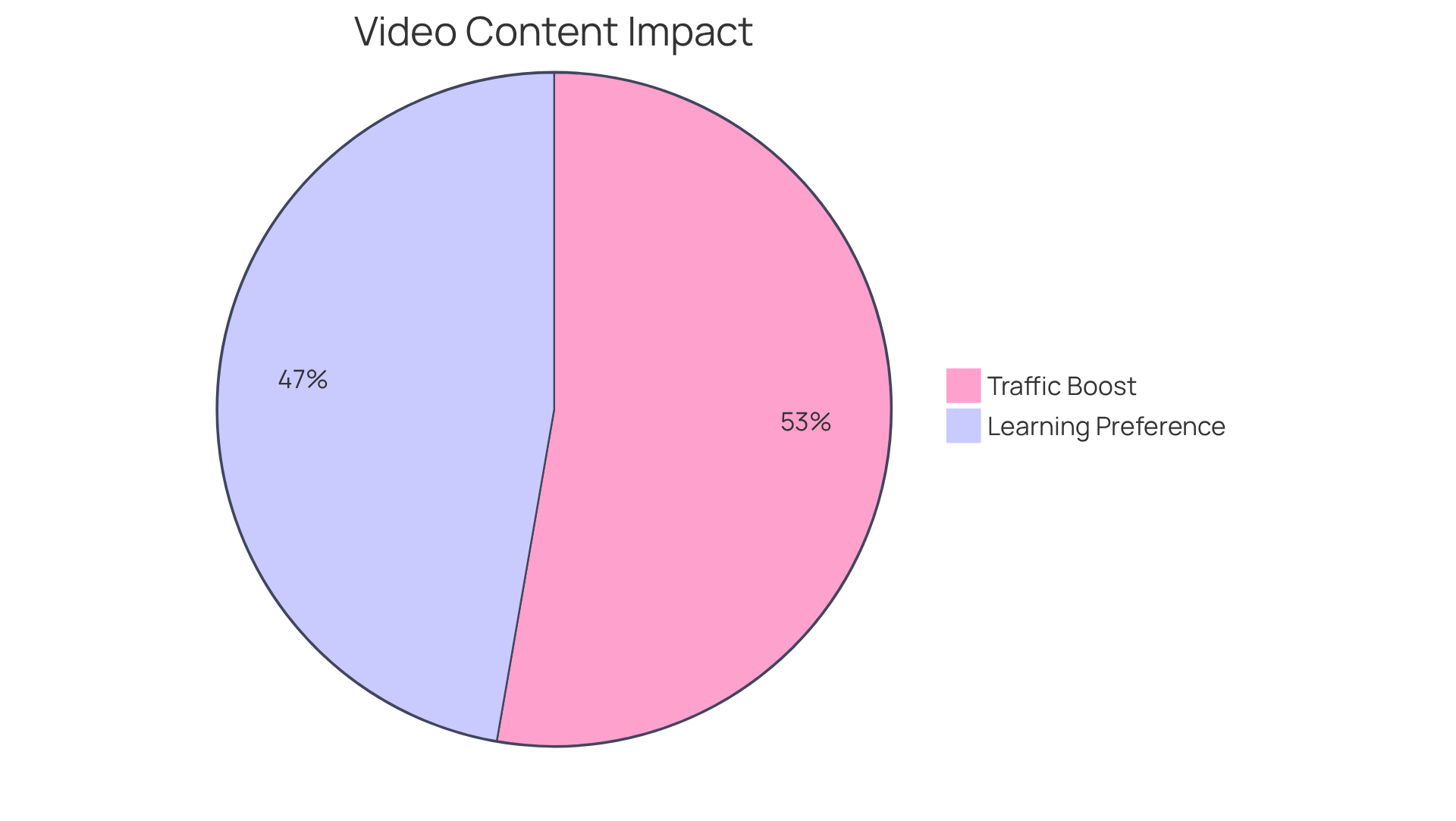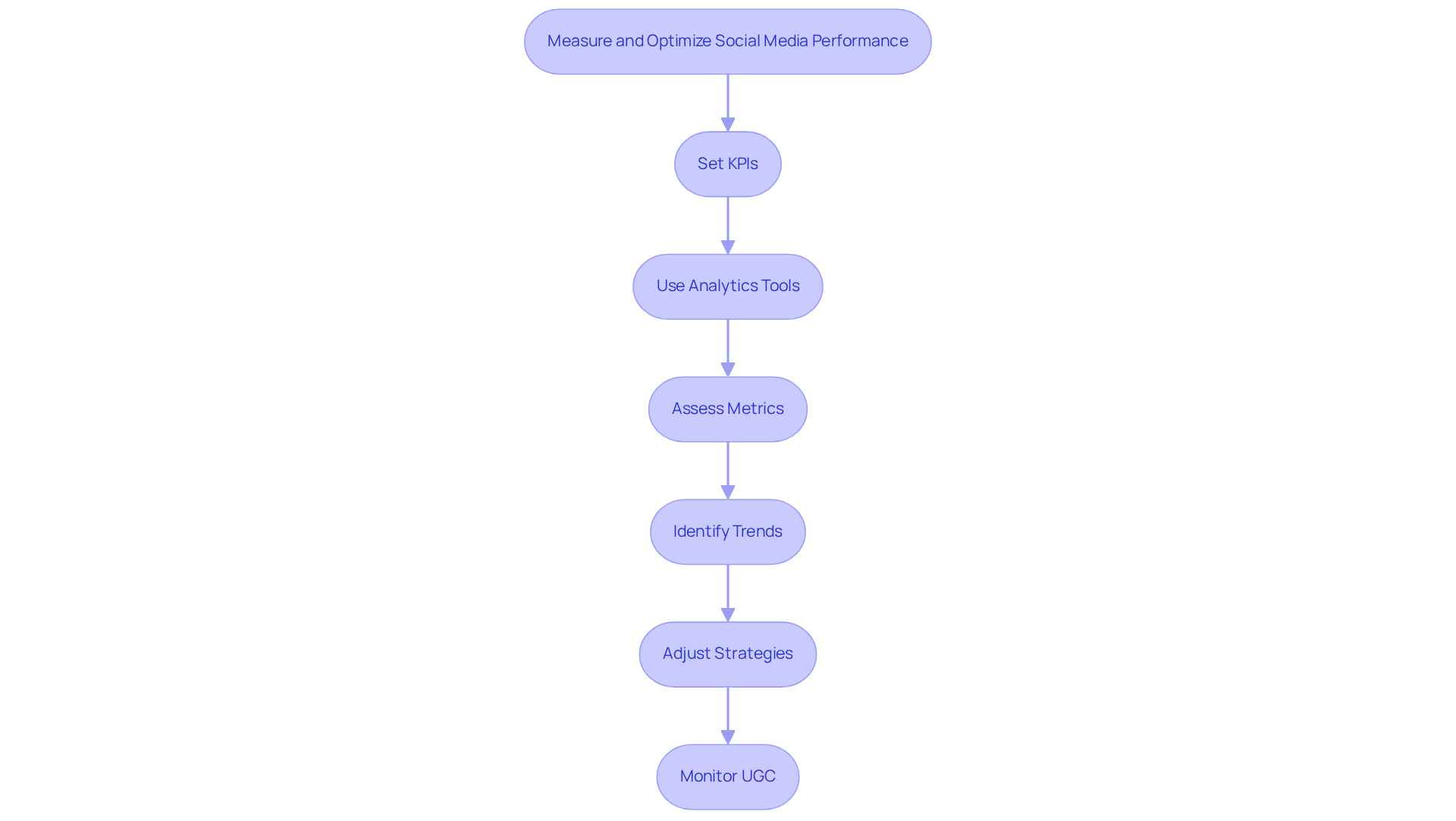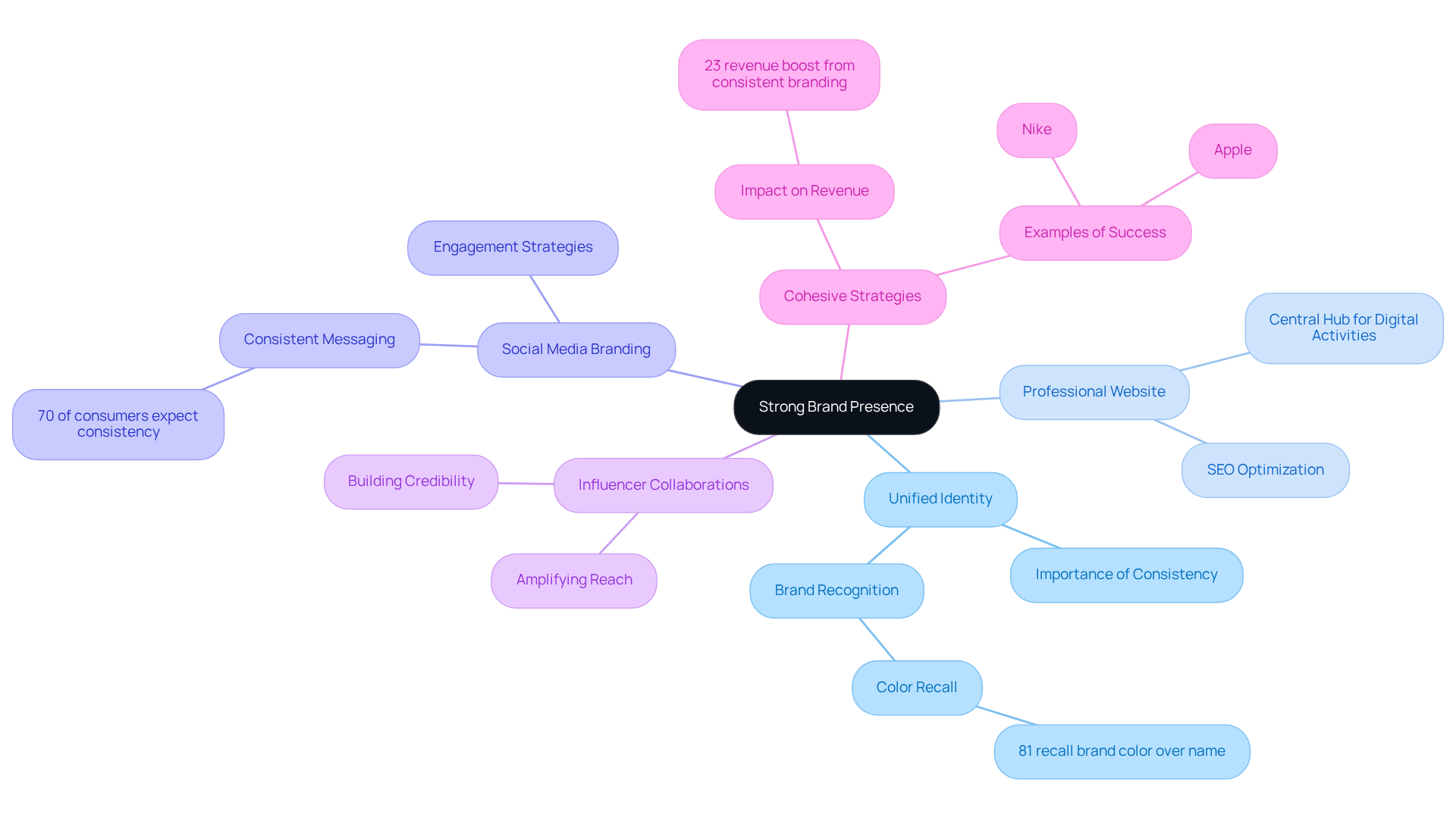Overview
In today's competitive landscape, tech startups often struggle to gain visibility and forge meaningful connections. This challenge can feel overwhelming, especially when trying to navigate the complexities of B2B marketing and social media. However, you are not alone in this journey. Many founders share similar experiences, feeling the pressure to establish a robust online presence that truly resonates with their audience.
The implications of not addressing this issue can be significant. Without an engaging online presence, startups may miss out on opportunities to build trust and authority within their industry. It’s essential to recognize that your brand's visibility is not just about being seen; it’s about creating a genuine connection with your audience. This is where the power of engaging content, like videos, comes into play. By sharing your story and insights, you can foster a deeper relationship with potential clients.
To navigate these challenges, consider focusing on maintaining consistent branding across all platforms. This consistency is crucial for building trust and establishing your authority. Remember, it’s not just about marketing; it’s about nurturing relationships that can lead to lasting partnerships. Embrace the journey of enhancing your visibility with compassion and understanding, knowing that every step you take is a step towards creating a supportive community around your brand.
Introduction
Navigating the intricate landscape of B2B marketing and social media can feel particularly daunting for tech startups. We understand that building trust and fostering relationships are not just goals; they are essential to your success. As the digital world evolves, these platforms offer a unique opportunity for you to establish authority, connect with potential clients, and enhance your visibility.
Yet, with 70% of business buyers discovering content directly on vendor websites, a pressing question emerges: how can you effectively leverage these channels to stand out in a crowded marketplace and drive meaningful engagement?
Together, let’s explore how you can turn these challenges into opportunities for growth.
Understand B2B Marketing and Social Media Fundamentals
Navigating the complexities of building relationships and trust among businesses can make and social media feel daunting, especially for . Unlike B2C marketing, which targets individual consumers, [B2B marketing and social media](https://sellerscommerce.com/blog/b2b-marketing-statistics) require a deeper understanding of a longer and more intricate sales cycle, often involving multiple decision-makers. This can be overwhelming, but it’s essential to recognize that online platforms can serve as a lifeline. They provide a vital channel for sharing valuable information, connecting with potential clients, and establishing your authority in the industry. LinkedIn, for instance, offers a unique opportunity to engage with professionals and showcase your expertise.
As we look ahead to 2025, the significance of these online platforms will only grow. Currently, 95% of B2B marketers are already creating content for these channels. This is a clear signal that startups must prioritize that authentically reflects their values and resonates with their target audience. After all, directly on vendors' websites. By leveraging B2B marketing and social media effectively, [tech startups](https://blog.rno1.com/10-best-web-design-agencies-for-innovative-digital-growth) can enhance their visibility and foster meaningful connections that drive growth.
, we understand the unique challenges you face. Our senior-level teams are dedicated to crafting engagement strategies tailored specifically to the needs of tech startups. We’re here to ensure that your are not only effective but also impactful, helping you carve out your identity as a leader in a competitive landscape. Together, we can navigate these challenges and build a brighter future for your business.

Implement Effective Social Media Strategies for Engagement
Engaging on social media can be a daunting challenge for . It’s essential to create that truly resonates with the needs and challenges of your . , case studies, and thought leadership articles can help establish your brand as a trusted authority in the field.
Visual materials, such as infographics and , are particularly effective; posts that feature images or receive ten times higher interaction rates than those with text alone. It's heartening to note that:
- 87% of marketers report that has significantly boosted traffic to their websites
- 78% of people prefer learning about products through short videos
This highlights the crucial role that video plays in the context of . Additionally, utilizing online advertising can help you reach specific demographics efficiently in B2B marketing and social media; platforms like LinkedIn generate over 80% of B2B online leads.
Engaging consistently with your followers through comments, polls, and direct messages fosters a sense of community. In fact, 46% of tech firms indicate that on these platforms is vital for their marketing strategy. By focusing on these approaches, tech startups can cultivate a strong that nurtures meaningful connections and paves the way for business growth.

Measure and Optimize Social Media Performance
For tech startups, setting clear can feel overwhelming, yet it's vital for efficiently assessing online performance. Without these essential metrics—like , reach, click-through rates (CTR), conversion rates, and —it’s challenging to understand how well your efforts are resonating. You may find yourself wondering if your content is truly connecting with your audience.
By employing tools such as Google Analytics and specific social media analytics platforms, you can gain valuable insights into and the effectiveness of your materials. Consistently assessing these metrics at set intervals allows you to recognize trends and discover which types of content resonate most with your audience.
For instance, if you notice that compared to static posts, it would be wise to direct more resources towards video production. Additionally, implementing A/B testing for various post formats can reveal the most compelling messaging and visuals, enabling you to make .
This repetitive method not only improves the performance of your materials but also aligns your online engagement efforts with larger business goals, ultimately fostering growth and interaction. Moreover, monitoring can serve as a powerful indicator of loyalty and community involvement, further enhancing your understanding of online platform effectiveness.
Remember, you're not alone in this journey; by embracing these strategies, you can cultivate a thriving that truly reflects your startup's vision.

Establish a Strong Brand Presence in the Digital Landscape
To establish a strong market presence, tech startups often face the challenge of cultivating a unified identity that truly reflects their mission, values, and unique selling propositions. It can be daunting, but a professional website becomes essential, serving as the central hub for all digital activities and optimized for search engines to enhance visibility. is vital for ; maintaining uniform logos, color schemes, and messaging helps forge a unified image that resonates with audiences. Engaging in marketing through blogging and guest posting can significantly enhance visibility and authority, creating a stronger connection with potential customers. Collaborating with influencers and industry leaders can further amplify reach and credibility, enabling startups to connect with a wider audience in a meaningful way.
exemplifies how innovative strategies can scale omnichannel ambassador programs, enhancing e-commerce engagement through influencer partnerships while fostering community involvement. This initiative includes:
- that drive campaign virality
- Leveraging design-driven solutions to create that speaks to the heart of the audience
Looking ahead to 2025, and social media will become even more essential. With 70% of consumers expecting companies to communicate consistently across all channels, the need for a in digital marketing is clear. Successful instances in the tech sector, like Apple and Nike, illustrate how a robust identity can result in heightened customer loyalty and market differentiation. This makes it essential for startups to focus on these strategies. Furthermore, , and 85% of consumers assert that . As noted by Sprout Social, two-thirds of consumers find it frustrating when brands make fun of their competitors, underscoring the importance of maintaining a that nurtures trust and respect.

Conclusion
In the ever-changing world of B2B marketing, especially for tech startups, it’s crucial to grasp the subtleties of social media and digital branding. Many founders find themselves overwhelmed, struggling to carve out a strong online presence. This struggle not only hinders connections with potential clients but also prevents startups from being recognized as credible authorities in their fields. By focusing on strategic engagement on platforms like LinkedIn, tech startups can navigate the intricate web of B2B relationships and build trust among decision-makers.
Key insights from this journey reveal the vital role of high-quality content, particularly video, in fostering engagement and driving traffic. It’s essential to measure performance through clear KPIs, as this enables startups to refine their strategies and align their efforts with broader business goals. Moreover, establishing a consistent brand identity across digital channels is fundamental for enhancing visibility and cultivating a loyal customer base.
As tech startups look ahead, integrating these practices will be crucial. Embracing innovative strategies in B2B marketing and social media not only fuels growth but also enriches the overall customer experience. By committing to these approaches, startups can enhance their market presence, nurture meaningful connections, and ultimately achieve success in an increasingly competitive digital landscape. Remember, you’re not alone in this journey; together, we can navigate the complexities and emerge stronger.
Frequently Asked Questions
What is the main difference between B2B and B2C marketing?
B2B marketing targets businesses and involves a longer and more complex sales cycle with multiple decision-makers, while B2C marketing focuses on individual consumers.
Why is social media important for B2B marketing?
Social media provides a vital channel for sharing valuable information, connecting with potential clients, and establishing authority in the industry, which is crucial for building relationships and trust among businesses.
Which social media platform is particularly beneficial for B2B marketing?
LinkedIn is particularly beneficial for B2B marketing as it offers opportunities to engage with professionals and showcase expertise.
What percentage of B2B marketers are currently creating content for online platforms?
Currently, 95% of B2B marketers are creating content for online platforms.
How can tech startups enhance their visibility through B2B marketing and social media?
By building a robust online presence that authentically reflects their values and resonates with their target audience, tech startups can enhance visibility and foster meaningful connections.
What percentage of business buyers discover relevant content directly on vendors' websites?
70% of business buyers discover relevant content directly on vendors' websites.
What kind of support does RNO1 offer to tech startups in B2B marketing?
RNO1 offers engagement strategies tailored specifically to the needs of tech startups, ensuring that their marketing efforts are effective and impactful.




